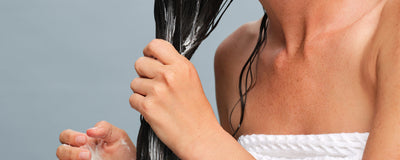Did you know that your haircare products could contain endocrine disruptors that can damage your hair? That’s because beauty and haircare products are often packed with ingredients known to be endocrine disruptors – in other words they contain chemicals that can cause hormonal imbalances that can lead to hair damage.
We spoke to Dr. Jennifer Weinberg MD MPH MBE, author of The Whole Cure and a leading expert on clean, natural living for optimal mind-body health. We wanted to get her take on the link between clean haircare and a healthy hormone balance.

According to Dr Weinberg, your hormones aren’t something you can afford to mess with — especially when it comes to products you use every single day. “It’s important to remember,” she told us, “that even if a single product seems harmless, repeated daily use over years adds up. Hormone disruptors are subtle but their long term effects can be significant.” Which is why Dr Weinberg is a vocal advocate of clean beauty and haircare.

The good news? Once you understand what endocrine disrupting chemicals (EDCs) are and where they hide, you can start making smarter choices that support — not sabotage — your hormonal health. Here’s Dr Weinberg’s guide to what endocrine disruptors are, how they affect your body, and how you can make hormone-safe haircare choices:
What Are Endocrine Disruptors (And Why You Should Care)
Endocrine disruptors are natural – or manmade – chemicals that interfere with your hormone system (endocrine system) by mimicking, blocking or disrupting your natural hormones. Dr Weinberg explains, “your endocrine system is a network of hormone-producing glands that regulate many bodily functions. Hormone imbalances can directly affect your vital organs at a cellular level.”

Exposure to EDCs has been linked to serious health issues.1 “Endocrine disruptors can cause a wide range of health problems,” Dr Weinberg told us, “including fertility challenges, thyroid imbalances, early puberty, breast and prostate cancer, and potentially hair thinning and premature greying.”

When we think about hormones, we often focus on puberty, periods, or pregnancy — but your hormones are responsible for so much more. From metabolism and mood, to sleep and sexual health, your endocrine system plays a vital role in keeping your body in balance. So, when something interferes with that system, the effects can ripple across your entire health.2
Key endocrine disruptors often found in haircare products:
❌ Parabens: methylparaben and propylparaben are preservatives that mimic estrogen and have been found in breast tumors.
❌ Phthalates: often hidden under “fragrance” and linked to genital development issues in unborn children.
❌ Triclosan: an antimicrobial that is believed to disrupt thyroid function.
❌ Sulfates: cleansers that are not directly endocrine-disrupting, but can make your skin absorb other toxins more easily.
❌ Cyclosiloxanes: disruptors often found in anti-frizz products that are easily absorbed into your skin.
❌ Formaldehyde: used in straightening and relaxing products and linked to cancer and other health issues.
On the positive side, one of the easiest ways to avoid toxic overload is to switch to clean beauty and haircare. “The clean beauty revolution,” says Dr Weinberg, “has come about because consumers are more informed about the health hazards from endocrine disruptors, and other harmful chemicals in hair and beauty products.”

“I’m personally very careful about the ingredients I use on my hair,” Dr Weinberg told us, “because the scalp skin is full of blood vessels and so it’s extra good at absorbing whatever you put on it.”
Shop Arey’s Best Selling Clean Haircare:
How Do Endocrine Disruptors Get Into Your Body?
Your skin barrier is your body’s first line of defense against toxins, pollution, and other skin irritants, but it’s also able to let in endocrine-disrupting chemicals under certain circumstances. Here are the main ways that EDCs can get under your skin:
1 – Absorption Through Your Scalp Skin
Your scalp is one of the most absorbent areas of your body. It has a rich blood supply, a high concentration of hair follicles, and relatively thin skin compared to other areas. When you use haircare products — especially when your scalp is warm and your pores are open (like during a hot shower) — chemicals can easily penetrate your skin and enter your bloodstream.
Some factors that influence EDC absorption include:
-
-
Length of exposure: the longer on your scalp, the greater the risk.
-
Product type: oil and alcohol-based formulas penetrate more easily.
-
Skin health: damaged or inflamed skin will absorb chemicals more easily.
-
Molecular size and solubility: smaller molecules sink in faster.
-
Even if you don’t apply a haircare product directly to your scalp – like a styling spray or mousse – the chemicals can still be absorbed through the skin on your face, neck, or hands during application.
Related: the best care for your hair and your scalp skin.
2 – Rinse-Off Vs. Leave-In Products
Here’s how different types of haircare products mean different levels of exposure:
-
Rinse-Off Products (e.g., shampoo, conditioner):
-
-
Typically in contact with the skin for a few minutes.
-
Still pose a risk due to the warmth and steam of showers increasing skin permeability.
-
⚠️Common EDCs: parabens (preservatives), sulfates, formaldehyde-releasing agents.
-
Leave-In Products (e.g., styling creams, oils, serums, heat protectants):
-
Remain on the hair and scalp for hours or even days.
-
Prolonged contact increases the likelihood of absorption through the scalp and surrounding skin.
-
⚠️ Common EDCs: phthalates (often in synthetic fragrances) and synthetic UV filters like benzophenone.
“Endocrine disruptors are sneaky,” says Dr Weinberg. “Your haircare product's pleasant fragrance may be synthetic and contain unlabeled EDCs — like phthalates. These chemicals work silently and build up over time, potentially disrupting your hormones in ways you may not notice until years later.”
3 – Some Chemical Combinations Increase Disruption
One major concern with endocrine disruptors is not just their individual impact, but how they behave in combination. Many haircare products contain dozens of chemicals and this can increase their impact on your endocrine system.
Here’s how chemicals combine to boost hormonal imbalances:
-
-
The cocktail effect: combinations of low-dose chemicals can produce amplified hormonal effects — a phenomenon known as the “cocktail effect.”
-
Detox blocking: some chemicals may inhibit the body's ability to detoxify other chemicals, prolonging exposure.
-
Teaming up: EDCs can work in tandem to create combinations that can mimic or block hormones like estrogen, testosterone, or thyroid hormones, leading to disrupted reproductive development, metabolism changes, or increased cancer risk over time.
-
“Reading ingredient lists is very important to get a good idea of how toxic any product might be,” advises Dr Weinberg. “For example, are you combining a shampoo with parabens with a conditioner with fragrance containing phthalates, and then adding a leave-in with UV filters like oxybenzone?” Most people use several products on their hair and skin, so it makes sense to take extra care when layering products.
Related: the three worst ingredients in shampoo that all hair types should avoid.
How Endocrine Disruptors Can Affect Your Health
Because your endocrine system is interconnected, disrupting one hormone can affect multiple bodily processes. Choosing clean skin and haircare is more than a lifestyle choice, it can be key to your long term health.
Some of the most concerning health effects associated with endocrine disruptors include:
-
-
Fertility issues in both men and women.
-
Thyroid dysfunction leading to fatigue, weight changes, mood disorders.
-
Polycystic Ovary Syndrome (PCOS) and irregular menstrual cycles.
-
Hormone-sensitive cancers such as breast or prostate cancer.
-
Immune system suppression and increased inflammation.
-
And it’s not all about you either. “What’s especially troubling about EDCs,” notes Dr Weinberg, “is that the effect of these chemicals may not just be limited to you — some research suggests that exposure to endocrine disruptors during pregnancy can affect fetal development and even the future fertility of your children.”
Arey – So You Can Confidently Make Hormone-Safe Haircare Choices
If you’re looking for great results without endocrine disruptors or other problem ingredients, then switching to clean haircare could make sense for you.

Your scalp and hair health is important to us. That's why Arey is a clean haircare brand. We want to make clean haircare accessible, that’s why we offer up to 25% off on all subscription orders to help keep you on track with your hair health goals. Because we believe that clean science + consistency = results.
We are Arey.
Have questions? Check out our FAQ page or email us at hey@arey.com.
REFERENCES:

Beauty Sleep for Your Hair – The Sleep and Hair Growth Connection




